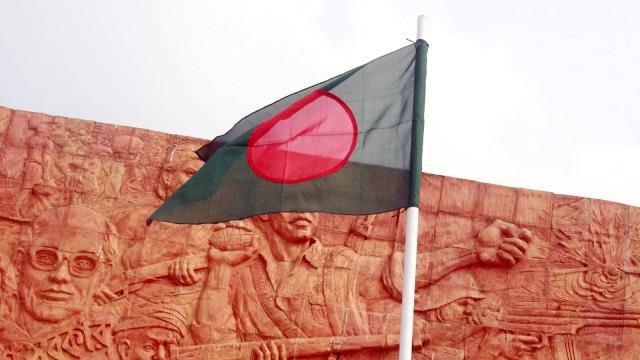Our Liberation War is our consciousness

The state of Bangladesh was born through a bloody all-out war But in this fight, this huge sacrifice was not just for a terrain or map. As a nation through the war of liberation, we wanted to get ourselves a state-of-the-art structure that would hold many specific ideals and values. In the citizens, they will create a range of unhygienic practices. It was not possible to implement those ideals and dreams in the state structure of Pakistan.
The more we will review the 'spirit of liberation war', the more we will become clear. This crude light of the first light now wants to look back towards its particular components. We can say that this is the primary step to understand and review the spirit of liberation war in the background of recent experiences. We can freely say that the ideals of liberation war that have been held in its early form, comes to the forefront of freedom, Bengali, democracy, non-communalism, equality and human rights. We quickly understand the background of these ideals.
Released:
Bengalis became disillusioned in the partition of India in 1947, not going for some time after partition. The main strength behind the establishment of Pakistan was the support of Bengali Muslims of East Bengal. From the beginning of the newly established Pakistan state framework, they were subjected to immense deprivation. The first publication of this deprivation was in 1952 language movement. The people involved in that movement are ordinary people, they are not cut off. From the 1950s till the '60s, a desire for liberation in the movement started in the minds of the people. Initially, the demand for the rights of the ownership. Soon it is moving towards the claim of independence. We got independence through liberation war, we got a sovereign state too. That's the greatest achievement of the liberation war. But in 1971 we loved the War of Liberation. Because, he had increased the range of demand for independence in the public war. The concept of 'liberation' as the concept is more broad-based. Release means release of human development.
Bengalism:
Until the Partition, the link between the many political-cultural 'Bengalis' could not have been linked to the majority of East Bengal's Muslim community. But after the establishment of Pakistan, the people of East Bengal made it the center of introduction of the concept of Bengalism as part of his political struggle. With the blood, they established Bangla language demand. Through the 1960s, along with the politics of which the cultural struggle continued, we established Bengalis on a very difficult road. Our victory in the war of liberation achieved the complete fulfillment of the ethnic proposal of Bengalis. But the idea of a healthy settlement of this concept was not with the different religious and minor ethnic elements on the independent country. His war continued in the eruption of political violence. The rest of us go further.
Democracy:
Thirst for almost all of Pakistan during the whole of our time was the struggle of all democratic rights. That announcement came in six rounds of Bangabandhu. Specifically to mention the 1970 election. In spite of the landslide victory in the elections, the Pakistani ruling group deprived the Awami League of democratic rights granted by the government to the government. To get that democratic right, we have to pour the blood of our chest. This election victory for the liberation war gave us a unique moral foundation.
Non-communalism:
The subcontinent was divided on the basis of religion. Pakistan's state was based on religion and politics in a narrow sense. But soon we made a non-communal lineage out of the religious boundaries outside Pakistan's state. In the 1960s, the mass cultural movement made non-communalism an integral part of our consciousness. Proof of the values that Pakistan was opposed to, the extensive Hindu rule in the war of liberation. The Liberation War established an unprecedented unity among the people of all religions.
Discrimination Block:
Since the establishment of Pakistan, the discrimination between the West and the East has begun to become clear. These two parts are very clearly followed by two reverse economic programs. Despite being ahead of the export, the investment in the eastern part of the country is less. Large and heavy industries are almost all built in the western part. A few wealthy families in the West have retained the overall control of the economy from the eastern part of business and commerce. Cuba's massive discrimination was seen in government jobs and military. This situation was revealed in the theory of two economies. The dreams of Bengalis started to happen soon. Its political reflection came in the six phases given by Bangabandhu Sheikh Mujibur Rahman and Awami League. The demands for the disruption of the 11-point demand of the students became more evident. The desire for discrimination was in agreement with independence.
Human Rights:
The struggle of 1971 and the liberation war, in a sense, is the struggle for human rights in one sense - their right to practice political ideology and cultural entities, the right to religion, the right to express and express. As a state, Pakistan was against it. But its violent manifestation took place in the liberation war. For the whole nine months, human rights have been tremendously drunk. In the words of Archer Blood, during the war, they carried out the 'select genocide' - just for the sake of political ideology, Awami League-pro-communists and communists and religious beliefs on Hindus.
Resteem bot Service! Boost Your Post. Send 0.200 SBD and your post url on memo and we will resteem your post on 5000+ followers from two different account.@stoneboy and @vimal-gautam.
Delegate STEEM POWER 1000 SP Or Any Amount Through v2.steemconncet.